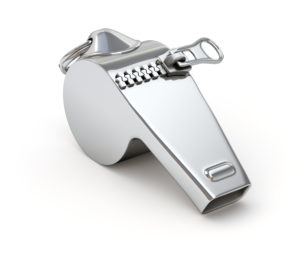Modern businesses are required to follow ethical practices to ensure that they don’t mistreat the environment, their staff or their customers without legal repercussions. However, it is safe to say that many companies regularly abuse their power and wealth and look to make shortcuts to boost profits.
You may be working for a business where you find they toe the ethical line and you aren’t sure where to put forward your concerns. The law in the UK for whistleblowing can be tricky to understand, so here is the definition.
What does whistleblowing mean?
An individual ‘blows the whistle’ when they disclose information which relates to suspected wrongdoing or dangers at work.
Whistleblowing concerns usually relate to the conduct of managers or staff, but they may sometimes relate to the actions of a third party, such as a customer, supplier or service provider.
The law allows whistleblowers to raise a concern with such a third party where they reasonably believe it relates mainly to the third party’s actions or is something that is legally the responsibility of the third party.
Should you blow the whistle?
There are plenty of horror stories where employees have raised concerns over their employers actions and subsequently been financially crippled and ridiculed by the company.
Dr Hayley Dare is one such example where blowing the whistle had a devastating effect on the employee’s life. In March of 2013, Dr Dare raised concerns over the care being given to some of her patients and staff at London Mental Health NHS Trust, which covers Broadmoor Hospital.
She quickly fell into depression after being sacked by the hospital, losing the subsequent court case and receiving a letter from the trust’s lawyers applying for £93,500.70 in legal costs against her, claiming she had acted ‘vexatiously, abusively, disruptively or otherwise unreasonably’.
More recently, the Panama Papers scandal of 2015 was such a high profile case that ‘John Doe’, the whistleblower who leaked 11.5m confidential financial documents, still remains anonymous from the press, as he says he fears for his life.
The leaked documents showed thousands of extremely wealthy individuals and offshore entities using Panamanian law firm and corporate service provider Mossack Fonseca as an outlet for fraud, tax evasion and evading international sanctions on money.
While it should be encouraged to call out corporations that act nefariously or unethically, it can be a huge decision to stand up to the power and might of your employer and you should be fully prepared and knowledgable to form the best protection.
What is the difference between making a complaint and blowing the whistle?
A complaint normally relates to an individual personally. This could be unfair treatment by a colleague or a breach of their contract of employment. Consequently, the individual has an interest in the outcome of the complaint. Such a complaint would normally be in the form of a grievance.
A disclosure of information by a whistleblower normally relates to something that may not personally impact on the individual but will impact on either the employer or a third party.
1. What protection does the law provide to whistleblowers?
Under the Employment Rights Act 1996 if an employee ‘blows the whistle’ they will receive protection from being dismissed or victimised (ie by being subjected to a detriment) because of their whistleblowing. This protection is a day one right.
A whistleblowing dismissal is automatically unfair and an employee does not need two years’ continuity of service to bring such a claim in the employment tribunal. Compensation is also uncapped. In relation to victimisation, a tribunal can award compensation for financial loss and injury to feelings (in the same way as discrimination claims).
The whistleblower will lose any statutory protection if they commit an offence when making the disclosure.
2. What qualifies as a disclosure?
The information must be in the public interest and serious and not merely a trivial matter. This may include: criminal activity; miscarriages of justice; danger to health and safety; damage to the environment; failure to comply with any legal obligation or regulatory requirement; bribery, financial fraud or mismanagement.
The public interest test can be satisfied even where the basis of the disclosure is wrong or there was no public interest in the disclosure being made, provided that the individual’s belief that the disclosure was made in the public interest was objectively reasonable.
3. How should the disclosure be made?
To gain protection, the disclosure would normally be made to: (i) the individual’s employer; (ii) some other responsible person where the individual reasonably believes the disclosure does not relate to the employer; or (iii) to a prescribed person defined by statute and the individual reasonably believes that the information given to that person is substantially true. However, protected disclosures are not limited to these three particular types.








